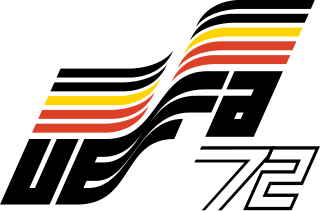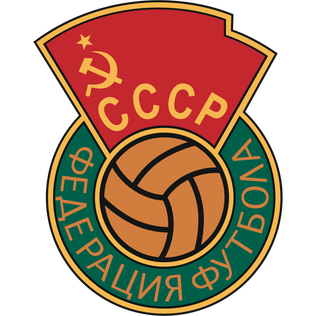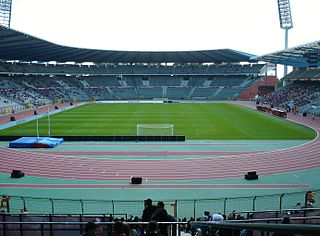Standings
| Rank | Team | Pld | W | D | L | GF | GA | GD | Pts |
|---|---|---|---|---|---|---|---|---|---|
| 1 | 6 | 4 | 2 | 0 | 12 | 0 | +12 | 10 | |
| 2 | 6 | 2 | 2 | 2 | 5 | 3 | +2 | 6 | |
| 3 | 6 | 2 | 2 | 2 | 2 | 4 | −2 | 6 | |
| 4 | 6 | 1 | 0 | 5 | 2 | 14 | −12 | 2 |
Group 2 consisted of four of the 32 teams entered into the European zone: [1] Italy, Luxembourg, Switzerland, and Turkey. These four teams competed on a home-and-away basis for one of the 9.5 spots in the final tournament allocated to the European zone, with the group's winner claiming the place in the finals.
| Rank | Team | Pld | W | D | L | GF | GA | GD | Pts |
|---|---|---|---|---|---|---|---|---|---|
| 1 | 6 | 4 | 2 | 0 | 12 | 0 | +12 | 10 | |
| 2 | 6 | 2 | 2 | 2 | 5 | 3 | +2 | 6 | |
| 3 | 6 | 2 | 2 | 2 | 2 | 4 | −2 | 6 | |
| 4 | 6 | 1 | 0 | 5 | 2 | 14 | −12 | 2 |
| Switzerland | 0–0 | |
|---|---|---|
| Luxembourg | 2–0 | |
|---|---|---|
| Dussier Braun |
| Turkey | 3–0 | |
|---|---|---|
| Osman Köksal |
| Italy | 0–0 | |
|---|---|---|
| Italy | 5–0 | |
|---|---|---|
| Riva Rivera |
| Luxembourg | 0–1 | |
|---|---|---|
| Odermatt |
| Switzerland | 0–0 | |
|---|---|---|
| Switzerland | 1–0 | |
|---|---|---|
| Blättler |
| Turkey | 2–0 | |
|---|---|---|
| Mehmet Türkkan Melih |

The UEFA European Football Championship, less formally the European Championship and informally the Euro or Euros, is the primary association football tournament organised by the Union of European Football Associations (UEFA). The competition is contested by UEFA members' senior men's national teams, determining the continental champion of Europe. It is the second-most watched football tournament in the world after the FIFA World Cup; the Euro 2016 final was watched by a global audience of around 600 million. The competition has been held every four years since 1960, except for 2020, when it was postponed until 2021 due to the COVID-19 pandemic in Europe, but kept the name Euro 2020. Scheduled to be in the even-numbered year between FIFA World Cup tournaments, it was originally called the European Nations' Cup before changing to its current name in 1968. Since 1996, the individual events have been branded as "UEFA Euro [year]".

The 1992 UEFA European Football Championship was hosted by Sweden between 10 and 26 June 1992. It was the ninth UEFA European Championship, which is held every four years and supported by UEFA.

The 1972 UEFA European Football Championship final tournament was held in Belgium. This was the fourth UEFA European Championship, held every four years and endorsed by UEFA. The final tournament took place between 14 and 18 June 1972.

The Soviet Union national football team is the national football team who represented the Soviet Union from 1922 to 1992.

The UEFA Euro 1972 final was a football match played at Heysel Stadium in Brussels, Belgium, on 18 June 1972, to determine the winners of the UEFA Euro 1972 tournament. It was the fourth European Championship final, UEFA's top football competition for national teams. The match was contested by West Germany and two-time tournament finalists, the Soviet Union.

The Soviet Union Olympic football team was the national Olympic football team of the Soviet Union from 1952 to 1992. The team participated in all of the qualification football tournaments for Summer Olympics. Until 1992, when age restrictions were officially introduced, the Soviet Union used the first team both in qualification tournaments and finals except for 1960 and 1964 when the second national team was used for the qualification tournaments.
Group 3 consisted of five of the 34 teams entered into the European zone: Czechoslovakia, Iceland, Soviet Union, Turkey, and Wales. These five teams competed on a home-and-away basis for two of the 14 spots in the final tournament allocated to the European zone, with the group's winner and runner-up claiming those spots.
Group 4 consisted of five of the 34 teams entered into the European zone: England, Hungary, Norway, Romania, and Switzerland. These five teams competed on a home-and-away basis for two of the 14 spots in the final tournament allocated to the European zone, with the group's winner and runner-up claiming those spots.
Group 1 consisted of four of the 32 teams entered into the European zone: Cyprus, Denmark, Poland, and Portugal. These four teams competed on a home-and-away basis for one of the 8.5 spots in the final tournament allocated to the European zone. The spot would be assigned to the group's winner.
Group 3 consisted of four of the 32 teams entered into the European zone: Austria, East Germany, Malta, and Turkey. These four teams competed on a home-and-away basis for one of the 8.5 spots in the final tournament allocated to the European zone. The spot would be assigned to the group's winner.
Group 6 consisted of three of the 32 teams entered into the European zone: Norway, Sweden, and Switzerland. These three teams competed on a home-and-away basis for one of the 8.5 spots in the final tournament allocated to the European zone. The spot would be assigned to the group's winner.
Group 9 consisted of three of the 32 teams entered into the European zone: Greece, Hungary, and Soviet Union. These three teams competed on a home-and-away basis for the half spot of the 8.5 spots assigned to UEFA in the final tournament. The European spot in the UEFA - CONMEBOL would be assigned to the group's winner.
Group 1 consisted of four of the 32 teams entered into the European zone: Austria, Hungary, Malta, and Sweden. These four teams competed on a home-and-away basis for one of the 9,5 spots in the final tournament allocated to the European zone, with the group's winner claiming this spot.
Group 3 consisted of four of the 32 teams entered into the European zone: Belgium, Iceland, Netherlands, and Norway. These four teams competed on a home-and-away basis for one of the 9.5 spots in the final tournament allocated to the European zone, with the group's winner claiming the place in the finals.
Group 4 consisted of four of the 32 teams entered into the European zone: Albania, East Germany, Finland, and Romania. These four teams competed on a home-and-away basis for one of the 9.5 spots in the final tournament allocated to the European zone, with the group's winner claiming the place in the finals.
Group 5 consisted of three of the 32 teams entered into the European zone: England, Poland, and Wales. These three teams competed on a home-and-away basis for one of the 9.5 spots in the final tournament allocated to the European zone, with the group's winner claiming the place in the finals.
Group 6 consisted of four of the 32 teams entered into the European zone: Bulgaria, Cyprus, Northern Ireland, and Portugal. These four teams competed on a home-and-away basis for one of the 9 spots in the final tournament allocated to the European zone, with the group's winner claiming the place in the finals.
Group 7 consisted of three of the 32 teams entered into the European zone: Greece, Spain, and Yugoslavia. These three teams competed on a home-and-away basis for one of the 9.5 spots in the final tournament allocated to the European zone, with the group's winner claiming the place in the finals. This group required a play-off to decide the winner.
Group 8 consisted of three of the 32 teams entered into the European zone: Czechoslovakia, Denmark, and Scotland. These three teams competed on a home-and-away basis for one of the 9.5 spots in the final tournament allocated to the European zone, with the group's winner claiming the place in the finals.
Group 9 consisted of three of the 32 teams entered into the European zone: France, Republic of Ireland, and Soviet Union. These three teams competed on a home-and-away basis with the group's winner advancing to the UEFA–CONMEBOL play-off with the winner of the play-off earning a place in the final tournament.